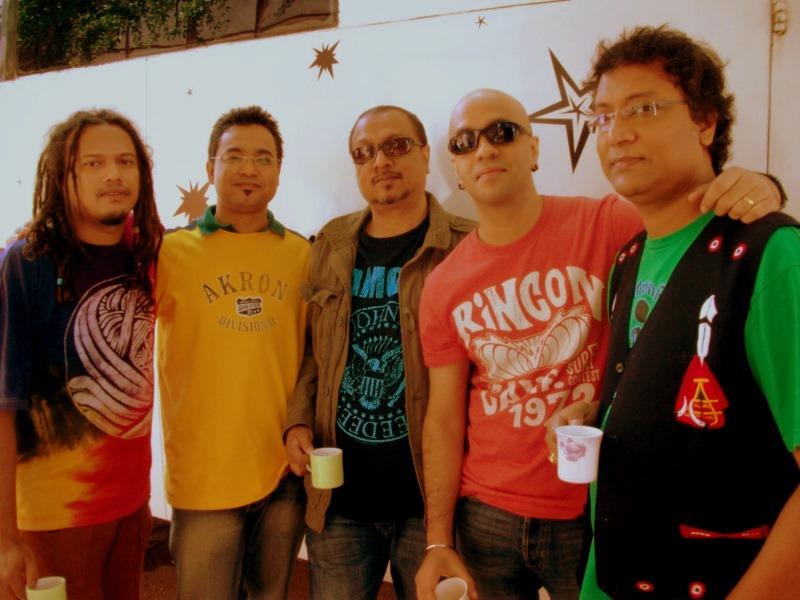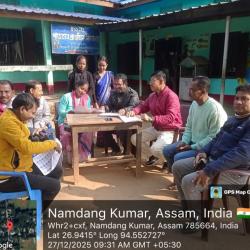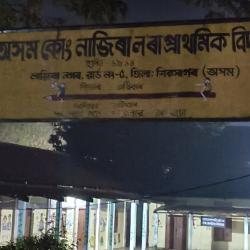Born in Digboi to Rohin Dhar Barua and Ranjana Barua, educated in Shillong and Guwahati, and now based in Mumbai, Joi has worked in a number of films as a playback singer, vocal arranger and background singer and has also sung for hundreds of ad jingles. The list of popular mainstream Indian movies where he has lent his voice runs long and the list includes the likes of 2010’s Filmfare Award Winner (OST) Udaan and National Film Award Winner Dev D. Practicing a mixed musical style incorporating elements of rock, soul, jazz, folk and world music, he shot to international limelight last year when he was among the 20 handpicked fellows at the first INK (Innovation & Knowledge) Conference, a TED- affiliated multidisciplinary conference, in Lavassa, and where he performed his song Tejimola, based on an ancient Assamese folklore, to a front row audience of celebs like James Cameron, Matt Groening, Linda Barry, amongst others.

He, along with his band Joi, released their debut Assamese album ‘Joi: Looking out of the window’ in December last year and the same became an instant hit, besides going on to redefine standards of contemporary Assamese music as a whole. The album fetched him the best debut awards at the 1st Big Fm Music Awards this year, but more importantly helped bring due recognition to this artiste who strives to let his compositions communicate with the soul.
The quest to commune with the soul
Many would associate soul singing, based on rhythm and blues, with legendary musicians like Ray Charles, Aretha Franklin or the “King of Soul” Otis Redding, amongst others – who helped take the genre of soul music to its pinnacle in Northern America and from where it spread to other parts of the world and blended with other musical genres. However, Joi’s style of singing, in case you got confused, is not limited to just soul music.
“For me some of the biggest soul singers have been Bruce Dickinson, Sting, Freddie Mercury, John Lennon, Jimi Hendrix, Bhupen Hazarika, Bob Dylan, Tracy Chapman and the like. The soul in the singing is what really matters to me; that is what stays with me after the music dies. Peter Gabriel, another fine example of soul and world music; the way Joe Satriani plays, that’s soul. I want to sing with my soul, that’s what music means to me.” And this desire of Joi’s finds adequate reflection in his numerous compositions as well as all his other endeavours.
Feel is Paramount
In all probability, Joi’s love for music is probably something he was born with. But the contributions of a few people in his life cannot be overlooked; one being his school principal Sister Mabilia who guided Joi’s love for singing while in junior school and whom he regards as his first and only guru. A lifelong inspiration, as he puts it. The earliest inspiration, however, was his father who gifted him his first violin. “My father was the one who kickstarted the passion by teaching me the rudimentary notes ‘do re mi’. An amazing musician himself, he played with great feel and he was the one who taught me the important lesson that in music feel is paramount.”
The quaint oil township in the upper reaches of Assam where he spent his initial days and his subsequent days in Jorhat, growing up with his family and following the intrinsic Assamese traditions and rituals, also contributed a lot to the growth of the artist in him. “Digboi was a beautiful colonial-looking oil town with lovely houses amidst a thickly forested landscape. The beautiful quietness of the town then is what I liked about Digboi; in the evenings one would get to see large bat-like flying squirrels jump from tree to tree. Looking back now, when images of the town come to my mind, it was like we were living inside a period movie where time stood still – the air was clean and silence was a companion. It was lovely to walk around the small roads and nooks and smell the trees, the lushness.”
The quietness of the evenings in Digboi where he played his violin to the fading sun was in sharp contrast to life in the joint family in Jorhat where his family later shifted. The music however was constant. “Ours was a joint family. There would be lot of people, a lot of energy, a lot of madness; we would play cricket, football, run, sing. I used to play my violin while my cousin would play his sitar. My grandfather used to insist that we sing our devotional songs every evening; that is how I learnt to play the negera, khol, taal and sing our guxai naam.”
As he grew up, rock too began to make an impression on him and he and his cousins spent countless hours listening to music, jamming together and making new songs. “Right from the Beatles, Eagles, Deep Purple, MSG, Simon and Garfunkel, Iron Maiden etc, we sang them all.” From Carmel School in Jorhat to Commerce College in Guwahati where he did his graduations, the music kept flowing. The way fishes take to water, Joi did to music and looking at any stage of his life, from any perspective, it is difficult to visualise him doing anything else.
Mumbai beckons
The feeling of stagnation and the need to break through from monotony is probably something which many an artist has to contend with. Joi was no different and it was this very feeling of stagnation that forced him to shift from Delhi – where he had moved to after his graduations – to Mumbai in 2003. “The first person I called was Zubeen and he really helped me a lot. I stayed with him in the initial period and he took me around to meet music directors and the other key people in the industry.”
It was a fun audition with Jatin Sharma which brought Joi his first break in Bollywood. “My first recording with Jatin was for ‘Sajana hai mujhe’ – a remix with singer Vaishali Samant and which was mixed with Shaggy’s ‘Sexy Lady’. This became an enormous hit. This was then followed by another magnum production – ‘Dekh Le – the club mix’ from Munnabhai MBBS with Sunidhi Chauhan.” After two mega hits, life was never the same again for Joi. “I used to sing in English and that became a rage. There was a huge initial bulk of work that I did with Jatin Sharma and working with him led me on to other people like Anu Malik, Ram Sampath, Anand Raj Anand, etc.”
Besides films, Joi has also been a part of some of the biggest advertising campaigns in the last few years and the organizations he has sung ad jingles for includes the likes of Fiat Linea, Vodafone, Reliance, LG, Hero Honda, Nescafe, Club Mahindra, Yatra.com, Raymonds, Tata Tea, Coca Cola Minute Maid, amongst others. “I was once singing for a film called Khakee for music director Ram Sampath, who is also one of the country’s biggest advertisement music honchos. He gave me my first break in an ad for Sanfrisco Jeans. This was noticed by other people and I soon found myself in the thick of the advertising world. Maybe I've sung for every major brand that there is in the country and with India's top advertising people.”
Looking out of the window
Though Joi has been making music since his childhood and has also established himself in the music industry of Mumbai, it was ‘Looking out of the window’ that made people in his own State stand up and take notice of the musician in him. The album, however, stemmed more as a result of his desire to “just sing some Assamese songs of his own”. As such, the fanatical response of the people towards his debut endeavor was something he never visualized. “Some of the people have just gotten to the songs. Yet the response has amazed me, humbled me. It has just reconfirmed my belief in the power of good, sincere music.”
Six months past the release of his debut collection, as he walks through obscure, nameless streets in Shillong, he is yet to get used to people walk up to him wanting to shake his hand; while walking on crowded streets back in our own State it will still take him time to get used to his new slow gait, on account of the frequent stops he has to make doling out autographs and smiles to young kids dragging along their helpless mothers; still get used to the cries of adoration from young women for whom he has become their latest heartthrob, one of their very own. And though it gets tiring, for everyone he encounters Joi always has a smile and a moment to stop and chat.
On one particular evening in the lobby of Hotel Brahmaputra Ashok, after battling yet another sudden crowd of fans that surprisingly appeared from nowhere, Joi and me got talking about his music and the genesis of his debut album. “I had been composing songs, random tunes with no specific intent, for a while now. Last year I played a few of them to Abani Tanti and within the next two days, the project Joi was born. Pawan Rasaily, Manas Chowdhary, Ibson Lal Baruah all agreed to be part of this music and take it ahead.”
Though the music was the defining factor, all of the members had different reasons for wanting to be part of the album. “Manas and Ibson wanted to sink their teeth into a project that involved good honest music. Pawan Rasaily felt that this would be a great gift from all of us to the people of Assam, now that we have the means and resources. Abani Tanti wanted to take it to the next level and set a benchmark for new sounds while I just wanted to sing my own songs.”
Listening to the album, the first thing to strike you is that the album has converged from a band’s point of view. A blend of rock, soul, folk and world beat, all the members have brought their own influences and ideas into the music. The defining factor of the album is the clean and clear music devoid of gimmickry of any sort, which is complimented by the excellent production quality – a first of sorts in the State.
A track which exemplifies this is the song Aaikon Baikon, which is being widely aired on the television channels and which seems to be on everybody’s lips on account of the catchy tunes and lyrics as well as the beautifully produced video. “I had made the initial scratch with some nonsense and funny lyrics though I did not know what to do with it. Keeping the phonetics same, it was Ibson who conceptualized the whole Aaikon Baaikon theory and the song took off like dynamite.” The lyrics revolve around the carefree lives of two young girls, Aaikon and Baikon, who used to play games in the usual carefree manner of children, and compares their childhood freedom to today’s modern day life, marked by its closed spaces and closed rooms.
Then there is the track Tejimola, which shifted the focus of the entire world community to Assam as he performed the number at the INK conference in Lavassa. Based on the Assamese folklore about Tejimola and her evil step-mother, the song has Joi asking the young girl not to be afraid and to smile on and keep playing with her dolls. With Lyton accompanying him on the piano, Joi’s soulful rendition does not fail to tug at your heart strings and has caught the fancy of the entire youth brigade. “That was an unforgettable experience. I was singing Tejimola in Lavassa to a front row audience of celebs and they were all in tears by the end.”
The album took about a year to be completed and during the entire process the members went about with ease, each of them contributing their ideas, experience and feel to this gift of theirs to the State where they come from. “We've all come from various backgrounds. Our stories, expressions and emotions have found a way through the music that we created. All the music that we've heard over the years – Sting, Clapton, Floyd, Bhupen Hazarika, Rahman, Rossini, Beethoven – have been responsible for nurturing our musical sensibilities. There is all of them there. And the best part is that all of us kept complimenting each other throughout the process.”
The journey has just begun
While the success of the album is yet to sink in for Joi and his band, the album is just a beginning for its members. On a personal level, his recently released song ‘Khirki’ for Hengool theatre is fast picking up and is well on its way to become one of the hits this year; the number Dil Dharakne Do which he sang for Shankar-Ehsaan-Loy in the recently released Jindagi Na Milegi Dobara is also earning a lot of appreciation in the national music circuits.
But success notwithstanding, the quest remains on making clean and clear music. This is best reflected in Joi’s own words, “I love singing and I go about it every day like I breathe. But now that the State and the people have extended so much love and support to my music, it gives me even more strength and resolve in my belief that I can and I should do much more.”
And once the soul gets singing, that doesn’t seem to be much difficult, does it?
TEAM joi – As seen by Joi Baruah
Ibson Baruah - Lyrics
Penned the lyrics from his soul. A traditionalist, true to earth musician who's maybe the finest gentleman you will ever encounter
Manas Choudhary - Bass
His bassplaying has nurtured right from the nooks and crannies of Assam and now the world's embracing it.
Pawan Rasaily – Guitar, Arrangements, Music programming
His playing has so much soul, always pushes me ahead to crack the new level. He defined the soundscope that we were looking for and many a times he was the sounding board, critique and counterpoint of my compositions. His feel will be matched by a very few.
Abani Tanti – Mixing and Production
The guardian angel. He was the man behind the machine and the album that u feel was something he created and gave birth to. He always believed in me and we knew that someday we would collaborate on something amazing. Maybe ‘Looking out of the window’ is absolute testimony to that belief.
|
References by author:
1. The Queen Of Soul by Mark Bego
2. Singing in a Strange Land: C. L. Franklin, the Black Church, and the Transformation of America, Little Brown, 2005.
 Kajal-streaked eyes, which you are hesitant to look into at first in case you get lost in their depths. A soft and at the same time confident voice that draws you close, at times unnerving you with its rawness but which also reflect a long-drawn communion with the inner self, making it linger long afterwards in your mind. A person who leaves his presence with you even after he departs. That is Joi Barua for you at first sight – our own home-bred futuristic musician and composer who is increasingly making his presence felt in the music circuit of the country.
Kajal-streaked eyes, which you are hesitant to look into at first in case you get lost in their depths. A soft and at the same time confident voice that draws you close, at times unnerving you with its rawness but which also reflect a long-drawn communion with the inner self, making it linger long afterwards in your mind. A person who leaves his presence with you even after he departs. That is Joi Barua for you at first sight – our own home-bred futuristic musician and composer who is increasingly making his presence felt in the music circuit of the country. He, along with his band Joi, released their debut Assamese album ‘Joi: Looking out of the window’ in December last year and the same became an instant hit, besides going on to redefine standards of contemporary Assamese music as a whole. The album fetched him the best debut awards at the 1st Big Fm Music Awards this year, but more importantly helped bring due recognition to this artiste who strives to let his compositions communicate with the soul.
He, along with his band Joi, released their debut Assamese album ‘Joi: Looking out of the window’ in December last year and the same became an instant hit, besides going on to redefine standards of contemporary Assamese music as a whole. The album fetched him the best debut awards at the 1st Big Fm Music Awards this year, but more importantly helped bring due recognition to this artiste who strives to let his compositions communicate with the soul.









Comments
Pages
Add new comment